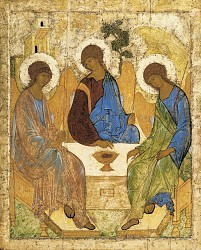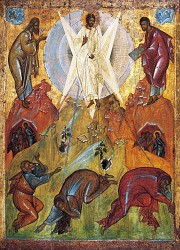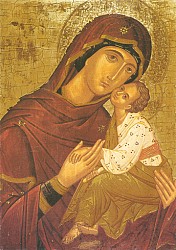THE ORTHODOX FAITH: Some Basic Principles
By Sister Ioanna (M.Th., M.A., Ph.D.)
St. Innocent Monastic Community, Redford, MI
(For a printable 1-page PDF file, click here.)
(for a printable, 2-page, back-to-back, trifold brochure PDF file, click here.)
♦ ♦ ♦ ♦ ♦ ♦ ♦ ♦ ♦ ♦ ♦ ♦ ♦ ♦ ♦ ♦ ♦ ♦ ♦ ♦ ♦ ♦ ♦ ♦ ♦ ♦ ♦ ♦ ♦ ♦ ♦ ♦ ♦ ♦ ♦ ♦ ♦ ♦ ♦ ♦ ♦ ♦ ♦ ♦ ♦ ♦ ♦ ♦ ♦ ♦ ♦ ♦
WHAT IS THE ORTHODOX CHURCH?
The Orthodox Church is the over-2,000-year-old historic Church that Jesus Himself established and which was empowered by the Descent of the Holy Spirit on the Feast of Pentecost. The Orthodox Church has sought to adhere to the Apostle Paul’s command not to change any of the Apostolic Traditions and teachings that he taught, which had been received from Jesus, and handed down to us today. The word “orthodox” means both “correct teaching” and “correct worship.” Therefore, in addition to adhering to the unbroken line of Apostolic teachings, the Orthodox Church also continues the fullness and profound depth of worship of God passed down through the ages. The Church is not concerned with being “politically correct”— it does not dilute or alter its Faith and worship to accommodate the times.
WHAT DO ORTHODOX BELIEVE?
The Orthodox Church believes that God has revealed Himself to us as the Holy Trinity: God the Father, the Son and the Holy Spirit—three Persons, but One in Essence. Christianity’s fundamental doctrines are expressed in the Nicene Creed (“the Symbol of Faith”), written by the Church Fathers in 323 and 381 A.D. God the Father Almighty created everything that exists, visible and invisible. In order to save us from the consequences of our sins, God the Son became a man—the God-Man, Jesus Christ—born of the Ever-Virgin Mary. He suffered on the cross, was resurrected from the dead, ascended into heaven, and will come again to judge us. The Holy Spirit is the Giver of Life, Who proceeds from the Father, and is worshipped and glorified equally with the Father and the Son. Orthodox believe that Christ gave us the One, Holy, Universal and Apostolic Church, and affirms that in the life that continues after we die, the righteous shall be resurrected to live in God’s Presence eternally.
WHAT ABOUT THE BIBLE?
The Orthodox Church has the highest regard for the Bible and proclaims it as the Word of God; it has always been the primary spiritual reading for the faithful. The 4 Gospels are revered as the very Presence of Christ Himself. Furthermore, most of the hymns and prayers of Orthodox Divine Services are taken directly from the Old and New Testaments of the Bible. However, there is more to the fullness and depth of Christian Truth than can be contained in the Bible, because it wasn’t until the 4th century that the Orthodox Church gave us the complete New Testament. We also call upon the profound wisdom of many Church Fathers and Mothers drawn from many other sources, and use them to guide us in our understanding of the Bible.
WHAT ABOUT ORTHODOX WORSHIP?
To know God is to want to worship Him as deeply and fully as possible. The patterns of Orthodox worship are drawn from heavenly worship, as described in the Bible (especially in Revelation, Hebrews and throughout the Old Testament), and received from Tradition, wherein we on earth participate in the continual Divine worship, which is centered on worshipping God, not on entertaining us. We strive to use all the senses in making Divine worship as beautiful as possible in every way, worshipping “in the beauty of holiness.” There are many different Divine Services, but the most important one is called the Divine Liturgy, during which specially prepared bread and wine are changed by the Holy Spirit into the Body and Blood of Christ, which the Orthodox faithful receive in Holy Communion, after proper preparation.
WHY DO ORTHODOX REVERE SAINTS?
From the earliest times Christians have revered holy people (saints) and commemorated the anniversary of their deaths, especially the martyrs. They have always been regarded as ‘role models’ to be imitated, just as the Apostle Paul told all Christians to imitate him. Saints are revered, but never worshipped. We ask them to pray for us. Why saints? Every Christian is called to be a saint, because Christ commanded us to be perfect as our heavenly Father is perfect. The veneration of saints is vital to Orthodoxy, because the existence of saints affirms that it is truly possible to fulfill the Christian vocation—to become conformed to the Image of Christ and to be united with Him.
WHY DO ORTHODOX HAVE ICONS?
Icons, the sacred images of the Orthodox Church (such as you see here), are absolutely essential to Orthodoxy, because (a) they affirm God’s Incarnation in Jesus Christ; (b) they affirm the goodness of the material world that God created; and (c) they affirm that the physical world has the potential for being transfigured as it participates in the restoration of humanity to the beauty of the Divine Image and Likeness. Icons make visible the invisible reality of the transfigured life of the Kingdom of Heaven, and make present to us today the great events of salvation-history, and the great heroes of the Church—the Saints. We venerate icons, but never worship them.
WHAT ABOUT ORTHODOX SPIRITUALITY?
Orthodox spirituality is a vital component of the Orthodox Faith, for it emphasizes that the whole goal and purpose of the Christian life is to know God and to constantly grow closer to Him; to have him live in one’s heart; and to be living temples of God’s Presence in us. Orthodox spirituality proclaims that human nature is not hopelessly corrupt, but ‘tarnished,’ calling upon the faithful to become transfigured and restore the original image and likeness in which we were first created—to become deified or like-God. This high concept of human nature includes that we are to work together, or co-operate with God in serving Him in the world.
The means by which we can acquire the Holy Spirit and realize these goals of human life is above all, by prayer, both corporate worship and private prayer. Especially emphasized is the practice of praying continually by saying the Jesus Prayer repetitively: “Lord Jesus Christ, Son of God, have mercy on me, a sinner.” Other elements of the spiritual life, and the means of realizing its goals, are regular and frequent worship and receiving Holy Communion, reading the Bible and other spiritual writings, alms-giving, fasting, doing good works, and treating everyone with love and respect, seeing the image of Christ in every human being.
WHAT ABOUT ORTHODOX MORALITY?
Orthodox moral principles are central to Orthodoxy, because they are the outward expression of the Faith. Its central principle is putting into practice Christ’s commandment to love not only other humans, but His whole creation. This means we are not only to protect the entire created world around us, but to have a profound reverence for the sanctity of all life, and to actively seek to protect all that has been created by God—the Giver of Life. This means to protect the life of those who cannot protect themselves—the unborn, children, sick, elderly, and animals.
Orthodox morality emphasizes the sanctity both of marriage between one man and one woman, and of the traditional Christian family, into which children are born. Reverence for life means to respect the way God has created us, including our gender, and not to defile the body in any way, such as by drugs or mutilation, for it is the temple of God. Orthodox morality maintains that Christ’s commandments are as relevant and true today as they were 2,000 years ago. This means that sexual expression should be only within a Christ-centered marriage between a man and a woman. Orthodox morality emphasizes seeing the Image of Christ in the face of all human beings, and that therefore, we are called to feed the hungry, clothe the naked, give shelter to the homeless, and visit the sick and the prisoner. It means to oppose violence, greed, and using others as a means of promoting one’s own self-interests. Orthodox morality calls for living in the world but not to be of the world. This means to reject living solely for fun and pleasure and acquiring things, and being preoccupied with the latest fads, fashions and styles as being the most important things in life. Orthodox morality means, in essence, to live and act as Christ Himself would act if He were in our shoes.
March 2017.
[This is also available as a 2-page, tri-fold brochure PDF file, and a 1-page PDF file.]


